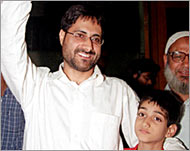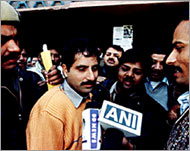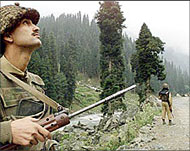Kashmiris in Delhi feel victimised
In sharp contrast to the bright and cosy creations of its earth and artisans, the people of Jammu and Kashmir seem dull and despondent.

Particularly depressed are Kashmiris who move in and out of the conflict-torn state for work and studies to the Indian capital.
Shawl-sellers, carpet-weavers, fruit traders and students in Delhi from the only Muslim-majority state in India complain about daily victimisation at the hands of police and society. Neither wealth nor education, they say, provides immunity:
“Our Kashmiri Muslim identity is a curse,” says Rouf Shah, a 29-year-old graduate from Srinagar, who has a family business of hand-woven and embroidered woollens in Delhi.
Insurgency
Referring to the 14-year insurgency in his home state and the state reprisals, Shah says, “A vast majority of Kashmiris are paying for the sins of a few, both in and outside the state.”
Corroborating the view, a human rights group report says, “Kashmiri Muslims residing in Delhi feel unsafe, humiliated and at the mercy of the local police.”
| ||
“Even before they leave J and K, they are aware that they will be met with hostility and suspicion but nothing that they have heard before prepares them for the actual encounters in the rest of India,” says the report titled, “Shadow of Fear—Harassment of Kashmiri Muslims in Delhi”.
The report by human rights group, People’s Union for Democratic Rights or PUDR is based on interviews with scores of Kashmiris in Delhi and was published in early 2002.
The rights group is concerned about the crackdown on Kashmiri Muslims and the attendant excesses in the wake of a deadly attack on India’s Parliament House in December, 2001.
Three of the four people alleged to have been involved in the conspiracy behind the attack were Kashmiris, living in rented accommodation in the Indian capital.
“The harassment of Kashmiris is in direct proportion to the security alerts sounded by the government. The higher the alert, the more the harassment,” says PUDR President Gautam Naulakha.
“Body searches in trains and buses, rummaging of baggage, demands for money or even shawls and carpets are common, and encounters with the police are often laced with the choicest abuses about them being Kashmiris, their religion, their love for Pakistan and their involvement in terrorist activities,” he says.
The PUDR team too, he says, found the police “hostile” and “abusive” towards Kashmiris.
Police alert
A police alert to house-owners to verify the antecedents of tenants in the wake of the parliament house attack has also made people wary of Kashmiri tenants although Delhi has the highest number of Kashmiris living outside the state.
 |
|
Lecturer Gilani spent 22 months in |
Getting accommodation in small hotels and lodges is also not easy for Kashmiris.
“Hotel owners demand a lot of identification papers which is a big headache. So, we sleep in our trucks,” say fruit traders Abdul Rasheed and Manzoor Ahmed.
At least 1200 Kashmiri fruit-traders move in and out of Delhi every day during the peak season from October to February besides the other traders who make Delhi their home during winter.
The insecurity and fear they feel is underlined by the fact that all of them carry their voter’s identity card in their pockets.
The card, issued by the Election Commission of India, they say, is their “only security outside Kashmir”. “It is like a passport for us; catch us dead without it.”
The problems they face, according to Naulakha, are “enormous”.
The controversial Prevention of Terrorism Act or POTA, he says, “has made the situation worse than before”.
Police contest claims
The claim is however contested by Neeraj Kumar, the chief of a special anti-terrorism cell of the Delhi police that works under the federal home ministry:
“It is just false propaganda. The official review committee which has the powers to check abuse of the law has not pointed out a single case of POTA misuse by any wing of the Delhi police,” says Kumar, who is Joint Commissioner of Police.
According to him, “all those arrested under anti-terrorism laws, Kashmiris or non-Kashmiris, are genuine cases.”
 |
|
Ifthikar spent time in jail before |
Arrests
Officially, a total of 50 Kashmiris have been arrested under “anti-terrorism” laws over the last three years, the number having come down from 28 in 2001 to 12 this year. Last year, it was still lower, at 10.
Kumar interprets the persecution and fear reported by Kashmiris, “as a natural outcome of being a minority in a majority milieu”.
The rights group spokesman disagrees.
“There is a state pattern behind the persecution. In the 1980s, it was the Sikhs (majority religious group in north Indian state of Punjab) who were targeted as the enemies of the state and since the 1990s, it is Kashmiri Muslims who have been at the receiving end.”
It is, perhaps, the result of a high-powered propaganda that even educated Kashmiris have been at the receiving end.
Journalist Ifthikar Gilani and Delhi University lecturer S A R Gilani were both implicated in anti-terrorism laws.
The journalist spent eight months behind bars and the lecturer 22 months.
“I was targeted not only because I am a Kashmiri but also because of my father-in-law’s politics,” says the journalist Gilani, who is married to the daughter of Syed Shah Gilani, an All Party Hurriyat Conference leader.
The government implicated him to “discredit” his father-in-law, he says.
|
“A vast majority of Kashmiris are paying for the sins of a few, both in and outside the state“ Rouf Shah, |
Gilani was accused of treason because he downloaded information on the deployment of Indian troops along the border from a Pakistan-based web site—information that is open to every net-user.
The government withdrew the case against him after the Indian military intelligence gave him a clean chit in court.
Nightmare
The months he spent in Tihar, says Gilani, were a “nightmare”. Gilani’s employers spent $2500 on legal help and gave financial support to his family while he was in jail.
The Delhi University teacher feels anxious for the Kashmiris in detention: “I have to do something for them; it’s a call of duty but first I have to set my own life in order.”
Ironically, even such well-placed Kashmiris have not thought of legal recourse against the government for their implication in false cases while the ordinary Kashmiris seem resigned to their daily victimization.
Explaining their attitude, Naulakha says, they have the “typical mentality of a beleaguered people”.
The only way to end their silent suffering, he sums up, is to find a solution to the political problem of Jammu and Kashmir, but that seems like a far cry.
